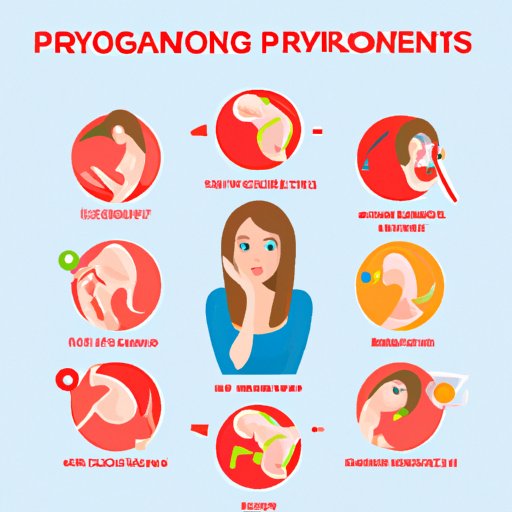
Introduction
If you’ve been trying to conceive, you’re likely wondering when it’s possible to have pregnancy symptoms. Knowing the signs of early pregnancy can be exciting and reassuring, but it can also be confusing and overwhelming. This article will help you understand pregnancy symptoms and early signs, separate myths from facts, and provide you with a timeline of what to expect.
When Will You Know? Understanding Pregnancy Symptoms and Early Signs
Pregnancy symptoms are physical or emotional changes that happen during pregnancy. Early signs of pregnancy are the first indicators that pregnancy has occurred. These symptoms may vary from one woman to another. Pregnancy symptoms occur due to hormonal changes in the body.
It’s important to listen to your body and pay attention to any changes you experience. Early detection and prenatal care are essential for maintaining a healthy pregnancy.
Early Pregnancy Symptoms: What to Expect and When to Take a Test
Some of the most common pregnancy symptoms include nausea, fatigue, breast changes, mood swings, food aversions, and frequent urination. However, some women may not experience any symptoms until later stages of pregnancy. The absence of symptoms doesn’t necessarily mean you’re not pregnant.
If you think you might be pregnant, it’s best to take a pregnancy test. You can take a home test as early as a few days after your missed period. It’s a good idea to take multiple tests to get accurate results. You can also consult your doctor for a blood test or to verify the results of a home test.
Is It Possible to Experience Pregnancy Symptoms Before a Missed Period?
Yes, some women may experience pregnancy symptoms before a missed period. It’s possible to experience implantation bleeding and cramping, which may be mistaken for a light period. Other early symptoms may include swollen or tender breasts, bloating, or headaches. However, not all women will experience symptoms before a missed period. Some may not experience symptoms until later in their pregnancy.
Pregnancy Symptoms Timeline: How Soon Can You Expect to Feel Different?
The timing of pregnancy symptoms depends on many factors, such as the individual’s body and the gestational age of the fetus. Some women may start experiencing symptoms as early as the first week of pregnancy, while others may not feel anything until a few weeks after conception. By week 6, most women experience nausea, vomiting, and food aversions. By week 8, fatigue, mood swings, and breast changes may occur. By week 12, most early pregnancy symptoms begin to fade.
It’s important to note that every pregnancy is unique! The timeline for early pregnancy symptoms may vary from woman to woman and may not align with the above.
The Truth About Early Pregnancy Symptoms: Dispelling Common Myths and Misconceptions
There are many myths and misconceptions about pregnancy symptoms that can cause confusion and anxiety. One common myth is that morning sickness only happens in the morning. However, morning sickness can occur at any time of the day or night. Another myth is that the absence of symptoms means something is wrong with the pregnancy. The truth is that not all women experience symptoms during early pregnancy.
Conclusion
Understanding early pregnancy symptoms and signs is essential for maintaining a healthy pregnancy. It’s important to listen to your body, pay attention to any changes, and seek medical advice if you suspect you may be pregnant. Remember, every pregnancy is unique, and it’s best to consult your doctor for personalized advice.
For additional resources, you can refer to the American Pregnancy Association website or consult your healthcare provider.




